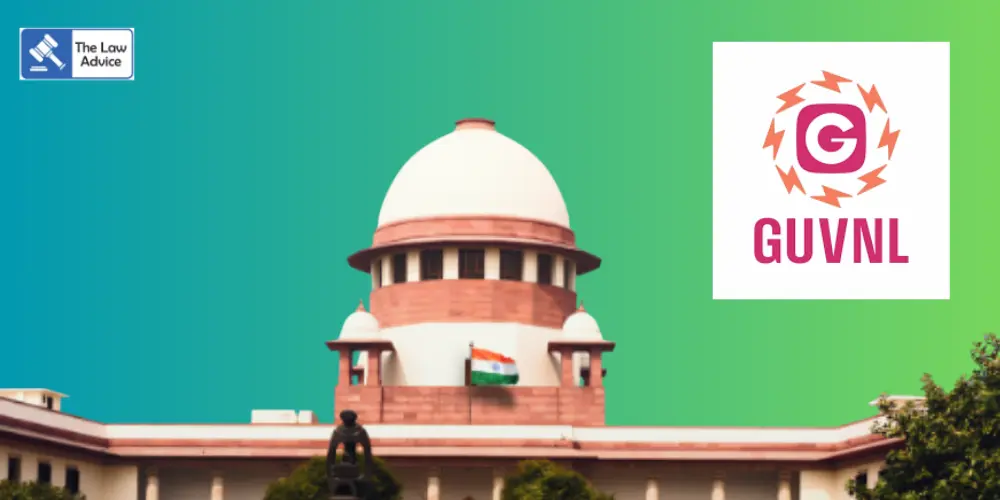The Supreme Court has granted major relief to Gujarat Urja Vikas Nigam Limited (GUVNL) by setting aside the Appellate Tribunal for Electricity’s (APTEL) March 2025 judgment and restoring the 2009 order of the Gujarat Electricity Regulatory Commission (GERC) in its long-standing dispute with Essar Power Limited (EPL) over diversion of electricity in violation of a Power Purchase Agreement (PPA).
A Bench comprising Justices Sanjay Kumar and Alok Aradhe partly allowed GUVNL’s appeal, holding that EPL had breached the PPA by failing to maintain the stipulated ratio of electricity supply — 58% to GUVNL and 42% to Essar Steel Limited (ESL) — and that such diversion entitled GUVNL to restitution and compensation.
The Court categorically ruled that the findings of GERC and APTEL denying reimbursement of fixed charges to GUVNL were unsustainable. “Once GUVNL did not receive the electricity for which such fixed charges had been computed and paid on a monthly basis, it was entitled to reimbursement thereof, not as compensation, but on the principle of restitution as such payment was not at all due from it,” the Bench observed.
Restoring GERC’s February 18, 2009 order, the Court found that APTEL had misinterpreted the contractual terms and ignored the rationale provided by the regulatory commission. It held that where a purchaser has already paid fixed charges for power capacity that was wrongfully diverted, principles of restitution demand that such payment be reimbursed.
The dispute traces back to a 1996 Power Purchase Agreement executed between the Gujarat Electricity Board (GEB) — the predecessor of GUVNL — and Essar Power Limited for the purchase of 300 MW from EPL’s 515 MW power plant. The remaining 215 MW was allocated to EPL’s sister concern, Essar Steel Limited, creating a 58:42 sharing ratio.
However, issues arose when EPL began diverting a larger share of power to ESL, thereby reducing the supply due to GUVNL. The matter eventually reached the Supreme Court in 2016, where the Court ruled that EPL must:
1. Adhere to the proportionate sharing principle,
2. Compensate GUVNL for diverted power based on the HTP-1 energy charge method, and
3. Reimburse fixed charges if GUVNL’s share was supplied to ESL.
Subsequently, when the case was remanded to GERC and later to APTEL for quantification of dues, both forums denied GUVNL’s claim for reimbursement of fixed charges and instead adopted an hourly computation method for diversion. Aggrieved, GUVNL approached the Supreme Court once again.
In its latest ruling, the Supreme Court clarified that GUVNL is entitled not only to compensation calculated as per the HTP-1 Tariff Energy Charge (as earlier settled) but also to reimbursement of fixed charges for the power it paid for but never received.
Elaborating on the conceptual difference between compensation and reimbursement, Justice Sanjay Kumar’s judgment stated:
“The very connotation of ‘compensation’ would imply the payment to be made to one party to make good the loss or damage suffered by it owing to a breach or violation of an obligation by the other. Reimbursement of fixed charges flowed from the provisions of the PPA itself and was not traceable only to the breach by EPL, in terms of the diverted capacity which fell to GUVNL’s share.”
The Court also examined the methodology used for computing diverted power, criticizing APTEL’s reliance on an hourly calculation instead of a half-hourly computation. The Bench observed that since the power generator itself had earlier endorsed computation on a half-hourly basis to avoid circuit breaker installation, it could not now object to the same method being used to calculate the quantum of diversion and corresponding compensation.
The judgment emphasized:
“Having invited that methodology for supply of power so as to avoid installation of a circuit breaker, EPL cannot fight shy of the same methodology being adopted for computation of the excess power diverted by it to ESL from out of the allocated share of GUVNL.”
Concluding the matter, the Supreme Court directed GERC to undertake a fresh computation of the total dues owed to GUVNL, in line with the clarified legal principles regarding both restitution and compensation.
The decision marks a significant reaffirmation of regulatory accountability and contractual sanctity in India’s power sector, underscoring that fixed charge payments for undelivered capacity must be returned under the doctrine of restitution rather than treated as compensation.
Case Title: Gujarat Urja Vikas Nigam Limited versus Essar Power Limited and Another
